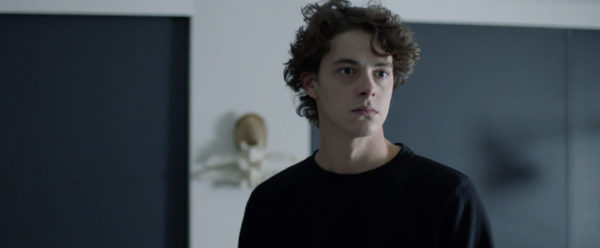
Every few weeks Joe (@bstolemyremote) and Terry (@gaylydreadful) discuss an episode of Hulu and Blumhouse’s Into The Dark series, alternating between our respective sites — queerhorrormovies.com and gaylydreadful.com.
This time around we’re checking out season one’s May entry, “All That We Destroy.”
Spoilers follow…
Synopsis: A geneticist who fears that her son may be becoming a serial killer, creates a group of clones in an attempt to cure him of his psychopathic tendencies by allowing him to relive the murder of his first victim.
JOE
Draw my face covered in ants or slam my head into the floor repeatedly – Terry, I think we finally have a winner when it comes to Into The Dark episodes!
It doesn’t hurt that we’re watching “All That We Destroy,” the eighth episode of season one, right on the heels of “Delivered,” which sadly proved to be one of the more disappointing efforts the show has ever done. Our main complaint about the series’ most recent outing is that it stranded two talented actresses and a great director in an 80 minute episode where virtually nothing happens. By comparison, “All That We Destroy” is brimming with ideas and compelling moral quandaries, so much so that as the film barrelled towards the climax, I found myself wishing there was more time to delve into several of these characters before things got wrapped up.
In brief, “All That We Destroy” is the story of successful geneticist Dr. Victoria Harris (Samantha Mathis) and her twenty-something son, Spencer (Israel Broussard), whom she has locked in their secluded home. Over the course of the episode, it is revealed in flashback that Spencer came upon stranded criminal Ashley (Aurora Perrineau) out in the desert, lured her back to the house and killed her. In an effort to curb her son’s serial killer instincts (and protect him from discovery), Victoria is repeatedly cloning Ashley so that Spencer can kill her. The problem is that Ashley isn’t “real” enough to satiate Spencer’s appetite and there’s a new neighbour, Marissa (Dora Madison) who just moved in…
In truth, the plot of “All That We Destroy” doesn’t look all that formidable on paper, but watching it play out onscreen is far more compelling. It doesn’t hurt that the film has a “5 minutes into the future Black Mirror“ vibe working in its favour, with clear cell phones, virtual holograms and cloning technology snuggled up against contemporary vehicles and kitchen appliances. This is very gentle sci-fi/horror, which allows screenwriters Sean Keller and Jim Agnew to hand wave away narrative contrivances (the doctor who invented cloning also happens to have a serial killer son) so that a more emotionally-rooted story can be told.
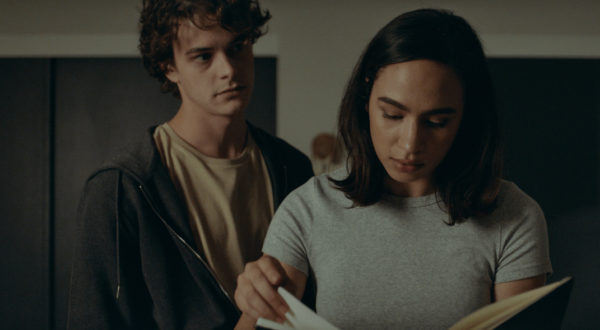
Looking over a few reviews for the film, I wasn’t surprised to see how many critics focused on the mother/son dynamic. This makes sense because at the end of the day “All That We Create” is inherently about the sacrifices that Victoria is making for Spencer and how far she’s willing to cover for him. It’s hugely compelling, especially when juxtaposed with the moral condemnation we as an audience feel about this obviously intelligent woman who allows her predatory son to roam free when there are vulnerable young women around.
What I’m saying, Terry, is that this shit is murky and complicated, so much so that by the end of the episode when the sixth or seventh version of Ashley has broken free and attacks Victoria, I didn’t know who to root for! There’s no clear hero or villain here, just a lot of shades of grey (literally encapsulated in the monochromatic costuming and visual aesthetic of the house).
Terry: this wasn’t your first screening of the film, so what were your initial impressions and did you have the same experience on the re-watch? Do you wish, like me, that we could have spent more time with Ashley? And I haven’t even touched on Chelsea Stardust’s direction (this is her feature debut before she broke out with Satanic Panic) or the expectation-subverting performance by cute-but-problematic-in-real-life Broussard, so be sure to tackle them, as well!
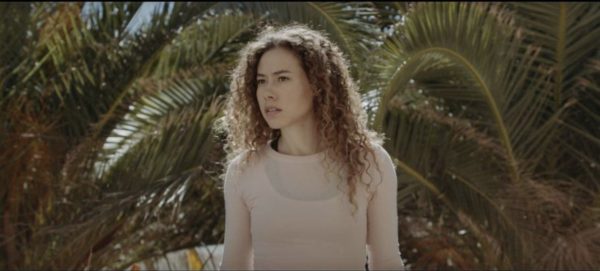
TERRY
Joe, first of all I’m so glad you enjoyed this episode because I honestly think it’s one of Into the Dark’s best. I did have the benefit of seeing this before, as I watched it to prep for my Scarred for Life interview with director Chelsea Stardust and, full disclosure, the writer (and her partner) Sean Keller made the music for our podcast. It has absolutely no bearing on my thoughts of the movie, but I wanted to put it out there.
My first viewing gave me the same thoughts as you, pretty much. The monotone and gray, muted colors of “All That We Destroy” mixes perfectly with the so-gray-it’s-painful thematic underpinnings. On one hand, I wanted to root for Spencer and Marissa’s growing friendship, thanks, to a large degree, because of Dora Madison’s bubbly and fantastic performance. She’s so earnest and sweet and she opens up a side of Spencer that he probably didn’t know existed. Like you were conflicted about rooting for Vic or Ashley in the climax, I found myself wanting this disgusting serial killer to get better and get the girl.
How sick is that?
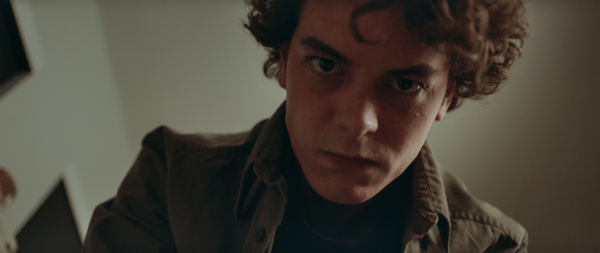
But that’s the spell this very slow burn weaved on first viewing. My second viewing, however, completely changed how I watched the narrative and the protective mother became a more stifling persona. Here’s a woman who knows her son does terrible things. I enjoyed the way the script introduced his two dogs, who both died from “accidents.” Because this narrative relies on cinematic history, we know Spencer killed them before it’s even revealed near the end. We also discover that he was a loner, but that he attended school until the 6th grade when he pushed his classmate too hard during a game of King of the Hill and she died a few days later from complications.
So the mother’s first reaction is to move away, seclude her son and teach him herself. But by creating and recreating the clones to create the perfect and curated recreation of the night of the murder, the big theme of “nature versus nurture” comes into question. By giving him his perverted desires while secluding him from the world and people, she’s created a persona that doesn’t see people. There’s just him and his mother. His father, who we only see in the holographic virtual reality, tells Vic that Spencer “was broken from the beginning. I wish you could have seen it like I did.” But we too don’t see it. Was he broken from the beginning? Did he mean to push the girl in 6th grade? And what was the timeline from accidentally killing the girl to killing the pets. Which happened first?
We see the selfishness in Vic from the very beginning and it only grows over the narrative. From the beginning, she’s using her son as a controlled experiment in behavior modification. When she sees a breakthrough in him, her first thought is that it “could lead to an entirely new kind of behavior modification therapy” while marveling at the applications of it. And this is where I started noticing the evil in Victoria herself, but it’s played so subtly that I missed it the first time.
When Marissa enters the picture, she opens up a world to Spencer that he’s never experienced. He’s never been to an art show, outside of virtual tours. He doesn’t know people his own age. He doesn’t know life. He’s just as much a clone now as he will eventually become in the denouement. “Mom said it was for the best,” he tells Marissa. And Mama Vic further hits that point home: “I am the only one who has ever been there for you. Who will always be there for you. No one will take care of you the way I do. Do you really want to throw that all away? For her?!”
It’s in this that the script really hammers home allusions to other horror stories, but one in particular is Victoria’s namesake: she has become, in essence, a modern day Victor Frankenstein. And Spencer is her monster. And like that parable, he doesn’t know how to interact with people outside of his heavily curated existence. The way the narrative structure operated for me, on second viewing, turned it into as big of a tragedy as Frankenstein.
I’m sorry, Joe, I didn’t even get to your other questions because your first was as densely interesting as the film. I think it’s because we haven’t had too much to dig into and analyze in this series so far that I got giddy at thematically exploring the complex dynamics. I think this is why “All That We Destroy” works where a lot of the episodes of Into the Dark have failed us: the script is excellent and richly textured and benefits multiple viewings. Because while I mention Frankenstein, there’s other allusions here.
So to go back to your original quandary of the mother/son dynamic, did you see allusions to Psycho and other mom/son serial killing stories? Did you enjoy the performances Chelsea Stardust was able to wring out of her stars? And, going back to expectation reversals, did you notice just how black and dark Israel’s deep brown eyes were filmed here, contrasting with his role in Happy Death Day?
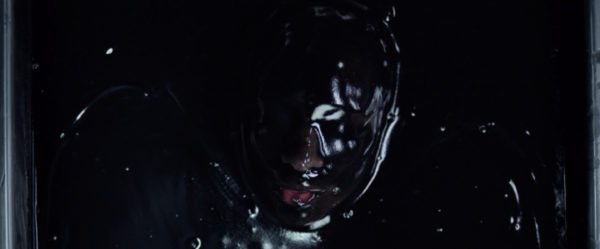
JOE
Oh wow, I’ll confess that I didn’t even consider the fact that Victoria may have socialized her son into becoming a serial killer. I definitely saw her as a villain, but mostly just because of her singular fixation on helping her son at the expense of the vulnerable women who constantly fall prey to his attacks.
The ending, in particular, is so effective because it’s drawing not just on Psycho (the reanimation of a dead loved one in an effort to recreate the past), but also because it plays on the cyclical nature of the film. While I really wish there was time and energy spent to develop Ashley into more of a character in her own right, her spa-like reanimation solely to be murdered over and over again is hugely compelling with regards to ethical rights of “non-human” clones, etc. It also, much more obviously, anticipates this ending where Victoria reanimates her monster once again, presumably under the auspices that the second time around, she’ll be able to “cure” him of his impulses. Inevitably the cycle continues…
So Terry, I sent you a link to a review of “All That We Destroy” on Medium that we were both aghast over. It outlines some of the issues in the film (the lack of character development for Ashley, the muted visual aesthetic, Broussard’s less-than-charismatic performance) but rather than engage with these criticisms (the first point) or attempt to understand the rationale (the latter two arguments), this person simply wrote off the whole film. At the time, I think he was an idiot, but in retrospect, I wonder if it’s because so much of the film’s power is rooted in the symbolism and iconography of the genre, compared to most of the Into The Dark entries that wear everything on the surface <cough “I’m Just F**king With You” cough>. I’m kind of stunned that so much is packed into what could be mistaken for a simple story.
Perhaps I’ll end with that note about Broussard. Politics of the actor aside, I think this is a great performance from him. I’ll confess that I was lulled into submission by his beautiful, luscious curls to take in his darker eye colour, but that attention to detail isn’t surprising given the savviness of this production. Like the costuming, like the blandness of Victoria and Spenser’s home, there’s so much to lull you into a false sense of security in this film, which just makes the frankly shocking violence that Spenser is capable of all the more jarring. Broussard is exceedingly adorable and charming in the Happy Death Day films, so casting him as a dissociated serial killer of women is genius because it is so against type. And I think it really works well for the film, because we want to like him. And we want him to get together with Marissa. That’s Stardust and Broussard using our goodwill and investment against us.
Overall, this is a really strong outing of Into The Dark for me. I’m giving “All That We Destroy” a 3.5/5.
Terry, perhaps I’ll leave accusations of misogyny and violence against women to you. How do you read Ashley’s repeated deaths? Does Marissa’s death and Ashley’s arrest in the climax seem punitive? And what score do you give “All That We Destroy”?
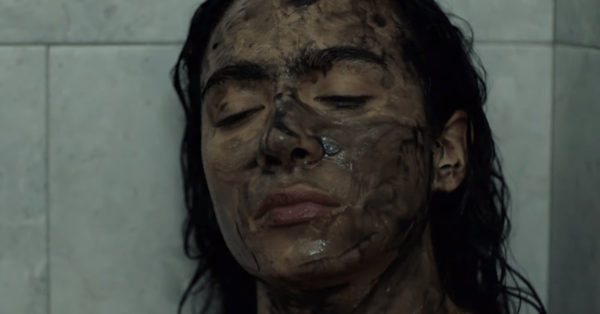
TERRY
Just to piggyback off of your first comment, I totally didn’t get the read of socialization on my first viewing. I was completely onboard with your reading of it. And I think that’s what made me fall in love with this movie more on second viewing: that it gave me something new to stew over. That’s the sign of good art: that we can rewatch something and come away with a completely different perspective. Trust me, I was stunned as I was taking notes this second time, going, “why the hell did I not pick up on any of this the first time?!”
I’m glad you brought up the misogyny and violence against women. Obviously the mother and son duo in this film are incredibly misogynistic in different ways. Victoria doesn’t think any woman is good enough for her son and wants to keep him with her. Spencer, through either his innate nature or the way his mother raised (and, maybe concerningly, groomed him?), gives him the idea that women belong to him. Because it was only when Ashley first rebukes him with an incredibly mild, “Easy Tiger,” that he lashes out in anger. How dare she deny me what I want! And whenever the clones are presented to him (side note: the way they are lovingly prepared by his mom and fucking groomed is disgusting in a Viriginal Sacrifice sort of way), it’s when they don’t act like he wants them to that he attacks.
I started noticing this time around the way Victoria looks at the video of Spencer and the puppy and the idea of rich white entitlement. Spencer has been groomed to think the world belongs to him. All he understands is the house and a mother who does literally everything for him. All he needs to do is work on his art and exist. He’s been trained to believe he’s the only one that matters because, after all, he’s the only one that matters to his mother. And so I think “All That We Destroy” uses misogyny in an interesting, if subtle, way to critique the culture of “Afluenza” or “boys will be boys,” particularly when they’re rich. He does the deed, his mom covers it up and it continues the same Ouroboros pattern that’s literally tattooed on Ashley’s arm.
So, yes, Marissa’s death and Ashley’s arrest is completely punitive and it’s a gut punch of a shocking ending, but it’s purposeful. Because as we see in real life, women don’t get the justice they deserve. And the cycle continues.
First watch of this movie, I’d give it a 3/5. This watch? 4/5 and maybe slightly higher.
Next time: We dig into June’s Pet Appreciation Week entry “Good Boy”, starring Judy Greer. See you back over at Gayly Dreadful.